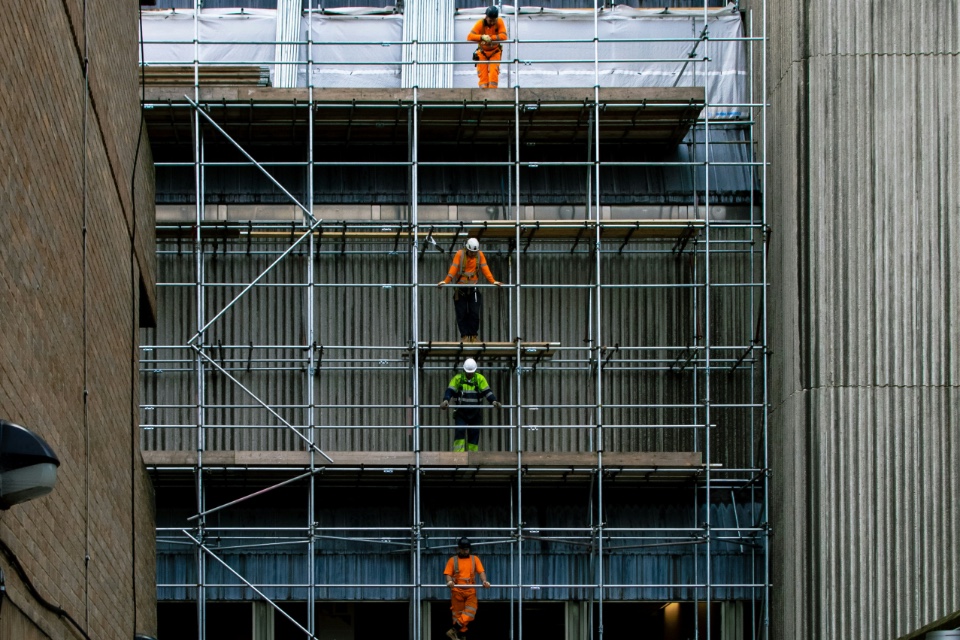In England, more than one in seven people say their mental health is either bad, or the worst it has ever been. Brits have faced a range of challenges in recent years, with inflation and the cost-of-living crisis continuing to affect mental health. In an attempt to combat this, movements like MIND have encouraged more open attitudes towards mental health in public and in the workplace, making it easier for people to discuss their problems.
This process has been undeniably helpful in legitimising the concerns of those suffering with mental health. However, there’s still a long way to go, particularly in male-dominated fields such as the construction sector. Employers’ past failures to provide adequate mental health support, coupled with a continuing culture of machismo, means that the construction sector has historically lagged behind when it comes to addressing mental health issues.
But, in recent years, a growing number of construction companies have begun to adopt mental health policies. Employers are beginning to foster a more open, conversational culture and training Mental Health First Aiders to provide additional support. One such company is commercial painting specialist Bagnalls, which has made great strides in embracing mental health support across the business…
Key Findings
- One in seven people in England say their mental health is bad or the worst it’s ever been.
- The number of people accessing NHS mental health services has increased by more than one million over the last five years.
- An HSE report points to five underlying causes of mental health problems in the construction industry: high-stress working environments, physical strain, job insecurity, long hours and stigmatisation.
- UK charity Mates in Mind found that over two-thirds of construction workers believe there is a stigma surrounding mental health that prevents them from talking about their issues with colleagues.
- Construction businesses can support employees by training Mental Health First Aiders to tackle mental health issues directly and adopting Wellness Action Plans.
Why is mental health more important now than ever?
Mental health is a huge concern across the UK; the number of people accessing NHS mental health services has increased by more than one million in the last five years. Since 2020, Brits have been forced to deal with successive COVID-19 lockdowns, followed by rising energy bills, a rocketing cost-of-living and a recession.
Research from the ONS shows that rates of depression are higher amongst those who are struggling to afford housing costs or energy bills. Rates are also higher among renters than homeowners, indicating a clear link between financial security and declining mental health.
Why are mental health matters so important in the construction industry?
The construction sector is affected by the same national issues impacting the UK’s wider mental health, but also faces a number of sector-specific challenges that are exacerbating the crisis.
An HSE report from October 2023 points to five underlying causes of mental health issues within the construction sector: high-stress working environments, physical strain, job insecurity, long hours and stigmatisation.
Wider economic issues are piling further pressure on some of these causes. Tightening budgets are making project deadlines more rigid than ever, while workers feeling the squeeze on their personal finances are more likely to take on excessive overtime.
Job insecurity has long been an issue in the construction sector, with many of the sector’s workers employed on a project-by-project basis. National financial instability means construction jobs feel less secure than ever, compounding the issue of job insecurity.
Mental health and machismo
The nature of the construction sector plays a key part in HSE’s fifth factor affecting mental health: stigmatisation. UK-based charity Mates in Mind found that over two-thirds of construction workers believe there is a stigma surrounding mental health that prevents them from talking about their issues. Given that construction is a largely male-dominated sector – with 82% of all UK construction workers identifying as male – it’s hugely important we break down these barriers to communication.
With machoism still sadly enduring in the sector, there is little surprise that suicide rates are higher amongst men working in this industry. Construction is one of the UK’s highest-risk industries for suicide, with suicide rates 3.7 times higher than the national average. Of those, four in five are men.
Modern companies must therefore make an effort to change this culture. Employers should provide proper outlets for mental health discussions foster an environment in which employees feel empowered to speak up.
What support should be available to people working in the construction industry?
Mental Health First Aid (MHFA) England exists to provide support to workplaces in a vast range of industries through adapted training and new resources. Striving to train one in 10 people in mental health awareness and skills, the organisation’s aim is to break down the stigma surrounding mental health and cultivate a culture in which speaking freely about your mental health is accepted.
Through the Mental Health First Aider course, members of a company or organisation can learn how to better listen, reassure and respond to people dealing with mental health struggles. In the male-dominated construction sector, where speaking freely about mental health can be an obstacle, it is more important than ever that colleagues are attuned to their peers’ feelings.
If an employee is still finding it difficult to talk openly about their mental health, Wellness Action Plans like those from Mind, can be a helpful alternative. These plans can also help employers understand their staff’s needs and concerns, particularly if traditional verbal conversations feel impossible.
There are many ways in which companies in the construction sector can help foster a more open culture. Bagnalls offers an Employee Assistance Programme, which is available to access all day, every day. Bagnalls are also expanding the number of Mental Health First Aiders in the company, making it easier for members of the team to get access to the proper support.
Bagnalls has a good relationship with Andy’s Man Club, helping the company to make the necessary changes to increase openness in the workplace. A spokesperson from Andy’s Man Club recently addressed the Bagnalls team on the importance of speaking up about mental health.
How can businesses in the construction sector benefit from implementing mental health support?
Stress, anxiety and depression account for one-fifth of all work-related illnesses, resulting in 70 million annual sick days across the industry. The related cost of these sick days is an estimated £70-100 billion. By providing adequate mental health support, employers can help create a safe space for employees, minimising the amount of days missed due to mental health concerns.
Not only this, but addressing mental wellbeing in the workplace could help increase productivity by as much as 12%, while helping employees to feel more valued at work. Whilst it may not always be possible to change how employees feel, it is always helpful to let them know that a support framework is in place should they feel ready to talk.
Joanne Gualda, Marketing Director at Bagnalls, comments: “Providing proper mental health support should be a requirement for businesses in any sector, but companies working in construction have a particular responsibility. By partnering with Andy’s Man Club and training our staff members to become Mental Health First Aiders, we hope to raise awareness and reduce the high suicide rate amongst people working in the construction industry.”
Photo by Chris Gray on Unsplash





